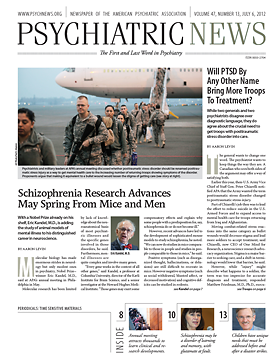“Geriatric depression is a hypothesis, not a syndrome,” George Alexopoulos, M.D., postulated at a symposium on geriatric psychiatry at APA’s 2012 annual meeting in Philadelphia in May.
Alexopoulos, a professor of psychiatry at Weill-Cornell Medical College in New York and founder and director of the Weill-Cornell Institute of Geriatric Psychiatry, has spent a career exploring the complexities of late-life depression.
Elderly patients who present with late-onset depression exhibit a different constellation of symptoms than older people whose depression first appeared when they were young, said Alexopoulos.
In general, late-onset patients appear to have higher rates of dementia, cognitive dysfunction, or structural brain abnormalities, he said.
That is because when depression starts late in life, it often occurs in people with vascular disease or severe vascular risk factors, he said. Rapid changes occur once vascular disease begins, including psychomotor retardation, apathy, lack of guilt and insight, disproportionate disability, and executive dysfunction.
The last of these has been the focus of much research attention, said Alexopoulos. Poor abstract thinking, difficulty planning, and perseveration leave patients messy and disorganized.
“They don’t get better executive function even if you treat their depression,” he said. “So we have hypothesized that there is a form of depression with executive dysfunction characterized by periventricular white-matter hyperintensities.”
Research shows that depressed patients who remit have similar volumes of hyperintensities as controls, while nonremitters have higher volumes, suggesting a different etiology or disease course.
Individuals with the s-allele of the 5-HTTLPR gene also demonstrated increased white-matter hyperintensities and poorer remission rates, leading Alexopoulos to speculate that the s-allele’s influence on poor remission may be associated with microstructural lesions in the prefrontal cortex.
In some ways, this syndrome resembles medial frontal lobe syndrome and has a poor response to serotonin antidepressants, he said.
In addition, the cognitive control network (including the anterior cingulate cortex and the dorsolateral prefrontal cortex) has been thought of as a structure remote from emotional events, but that may not be true, he suggested. The network is impaired in elderly patients and may cause a poor response to antidepressant drugs, although not to psychotherapy.
“Depressed patients with executive dysfunction respond well to problem-solving therapy,” he said.
Alexopoulos suggests the following etiology for late-onset depression among the elderly: vascular changes produce repair responses and inflammation, triggering a cascade of events leading to a predisposition for depression that is expressed in frontolimbic compromise, either alone or in response to neurobiological responses associated with stress that lead to mechanisms mediating depression.
With that in mind, he has tested several therapies, although so far without definitive outcomes, he said.
One trial of the anti-inflammatory antibiotic minocycline in six patients who had failed at least one antidepressant had mixed results. Two showed an excellent response, three were considered “good,” and one regressed.
Prevention studies have proved equally ambiguous. Trials of cholinesterase inhibitors, NMDA inhibitors, and statins have yet to show benefit, he said.
Taken together, the research leads Alexopoulos to state cautiously where the field stands at present and where it must go to find useful treatments.
“Vascular depression is not a syndrome,” he said. “It is a hypothesis about etiology and pathogenesis that has served as the conceptual basis for developing studies with testable hypotheses.”

